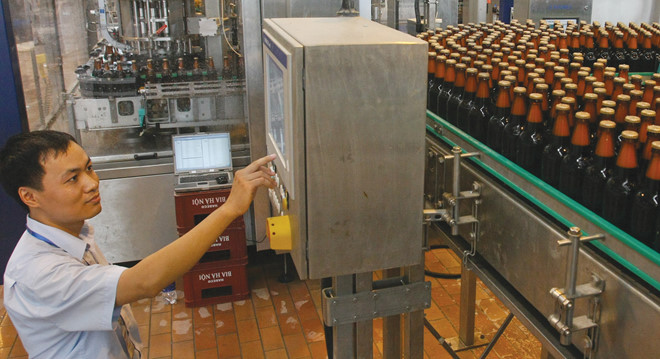Delayed state divestment, listing restrict growth of Sabeco, Habeco
 |
At Sabeco, the Ministry of Industry and Trade (MoIT), the state’s representative in the board of directors, approved Vu Quang Hai, son of former minister Vu Huy Hoang, as general director in 2015. Hai was 25 when he assumed the post, giving up his two-year position as the head of a loss-making PetroVietnam subsidiary.
Meanwhile, the State Audit of Vietnam’s 2015 audit of Habeco showed that the company’s unorthodox accounting practice made the 2014 net profit of VND927.13 billion ($42 million) unreliable. Habeco has subsidiaries in the construction and real estate sectors that run projects behind schedule, which means its investment practices are inefficient. A subsidiary, Habeco Haiphong, is not using the whole land area it is assigned to manage, which is a waste of government property.
The Vietnam Association of Financial Investors (VAFI), which asked the MoIT to explain the assignment of Vu Quang Hai to the post of general director in June, said that such use of personnel is tantamount to weak governance and weak management of state capital. VAFI also claimed that Sabeco and Habeco grew slowly over the past eight years, even though the field of beer, alcohol, and beverage in Vietnam has a lot of potential.
According to Nguyen Dinh Cung, head of Central Institute for Economic Management (CIEM), when leadership positions are assigned to people with no ability, companies will operate inefficiently. Economist Le Dang Doanh and former head of the Development Strategy Institute Luu Bich Ho both agreed that only when the two companies become public and listed will they become more efficient. Dao Van Hung, director of the Academy of Policy and Development, said that the private sector would do a much better job managing the two companies and that the government could reinvest its earnings from divesting from the two beer companies into infrastructure.
The state currently holds 90 per cent in Sabeco and 82 per cent in Habeco. In the middle of May, leaders of Sabeco said they had proposed the government sell 53 per cent of its stakes currently owned by the state. As of now, there is no further information on this scheme.
What the stars mean:
★ Poor ★ ★ Promising ★★★ Good ★★★★ Very good ★★★★★ Exceptional
Latest News
More News
- Vietnam GDP posts second-strongest growth since 2011 (January 06, 2026 | 08:35)
- Cake by VPBank posts strong gains in scale and efficiency leveraging AI focus (January 05, 2026 | 18:55)
- Vietnam's retail market tops $269 billion in 2025 amid e-commerce boom (December 31, 2025 | 19:00)
- Global alliance develops $1 billion AI data centre network in Vietnam (December 30, 2025 | 10:08)
- Businesses ramp up production as year-end orders surge (December 30, 2025 | 10:05)
- Vietnam’s GDP forecast to grow by 9 per cent in 2026 (December 29, 2025 | 08:29)
- Vietnam's top 500 value-creating enterprises announced (December 27, 2025 | 08:00)
- Three-way partnership unveiled to ease financing at Hong Hac City (December 24, 2025 | 14:13)
- PM orders investment model for North–South high-speed rail (December 22, 2025 | 17:43)
- First members of Danang International Finance Centre revealed (December 22, 2025 | 17:39)
















 Mobile Version
Mobile Version